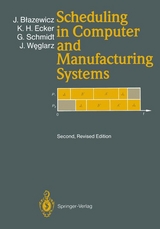Scheduling in Computer and Manufacturing Systems
Seiten
1993
Springer Berlin (Hersteller)
978-3-540-55958-0 (ISBN)
Springer Berlin (Hersteller)
978-3-540-55958-0 (ISBN)
Lese- und Medienproben
- Titel erscheint in neuer Auflage
- Artikel merken
Zu diesem Artikel existiert eine Nachauflage
This volume provides a theoretical and applications-oriented analysis of the deterministic scheduling problems that arise in computer and manufacturing environments. Different parameters, such as task processing times, urgency, arrival times, deadlines and processor speeds, are discussed.
This text provides a theoretical and application-oriented analysis of deterministic scheduling problems arising in computer and manufacturing environments. In such systems, processors (machines) and possible other resources are to be allocated among tasks in such a way that certain scheduling objectives are met. Various scheduling problems are discussed where different problem parameters such as task processing times, urgency weights, arrival times, deadlines, precedence constraints and processor speed factors are involved. Polynomial and exponential time optimization algorithms as well as approximation and heuristic approaches are presented and discussed in the context of particular problems. The most important classical results are surveyed, with particular attention paid to single-processor scheduling. Then more general models are studied, including parallel processors, resource-constrained scheduling, flexible flow shops, dynamic job shops, and flexible manufacturing systems. Besides the algorithmic approach, a general knowledge-based tool is presented for solving a broad class of practical scheduling problems.
For the presentation of algorithms, a PASCAL-like notation is chosen and used in almost all cases. For the convenience of less advanced readers, basic concepts from scheduling theory and related areas such as computational complexity analysis are included.
This text provides a theoretical and application-oriented analysis of deterministic scheduling problems arising in computer and manufacturing environments. In such systems, processors (machines) and possible other resources are to be allocated among tasks in such a way that certain scheduling objectives are met. Various scheduling problems are discussed where different problem parameters such as task processing times, urgency weights, arrival times, deadlines, precedence constraints and processor speed factors are involved. Polynomial and exponential time optimization algorithms as well as approximation and heuristic approaches are presented and discussed in the context of particular problems. The most important classical results are surveyed, with particular attention paid to single-processor scheduling. Then more general models are studied, including parallel processors, resource-constrained scheduling, flexible flow shops, dynamic job shops, and flexible manufacturing systems. Besides the algorithmic approach, a general knowledge-based tool is presented for solving a broad class of practical scheduling problems.
For the presentation of algorithms, a PASCAL-like notation is chosen and used in almost all cases. For the convenience of less advanced readers, basic concepts from scheduling theory and related areas such as computational complexity analysis are included.
| Zusatzinfo | 97 figs., 12 tabs. |
|---|---|
| Verlagsort | Berlin |
| Sprache | englisch |
| Gewicht | 645 g |
| Einbandart | gebunden |
| Themenwelt | Mathematik / Informatik ► Informatik ► Theorie / Studium |
| Technik ► Elektrotechnik / Energietechnik | |
| Technik ► Maschinenbau | |
| ISBN-10 | 3-540-55958-2 / 3540559582 |
| ISBN-13 | 978-3-540-55958-0 / 9783540559580 |
| Zustand | Neuware |
| Informationen gemäß Produktsicherheitsverordnung (GPSR) | |
| Haben Sie eine Frage zum Produkt? |

